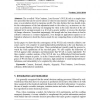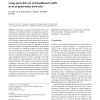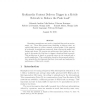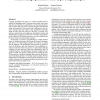ADVCS
2015
8 years 7 days ago
2015
Abstract: The so-called “Win-Continue, Lose-Reverse” (WCLR) rule is a simple iterative procedure that can be used to choose a value for any numeric variable (e.g. setting a pri...
ADT
2015
8 years 7 days ago
2015
This paper is concerned with long-term (20+years) forecasting of broadband traffic in next-generation networks. Such long-term approach requires going beyond extrapolations of past...
ADT
2015
8 years 7 days ago
2015
Abstract Cloud computing is a paradigm that provides access to a flexible, elastic and on-demand computing infrastructure, allowing users to dynamically request virtual resources....
ADT
2015
8 years 7 days ago
2015
Nowadays, smartphones are used to download files such as movies, music, etc. These files present some flexibility in delivery time; we exploit this feature to reduce network ov...
ADT
2015
8 years 7 days ago
2015
Shortest-path trees play an important role in the field of optimising fixed-access telecommunication networks with respect to costs and capacities. Distributional properties of t...
PPNA
2016
8 years 11 days ago
2016
Modeling and simulation can help to validate and evaluate the performance of wireless sensor networks (WSNs) within specific applications. In order to resolve the issue of the re...
POPL
2016
ACM
8 years 11 days ago
2016
ACM
We show the diagonal problem for higher-order pushdown automata (HOPDA), and hence the simultaneous unboundedness problem, is decidable. From recent work by Zetzsche this means th...
POPL
2016
ACM
8 years 11 days ago
2016
ACM
Cleaning spreadsheet data types is a common problem faced by millions of spreadsheet users. Data types such as date, time, name, and units are ubiquitous in spreadsheets, and clea...
POPL
2016
ACM
8 years 11 days ago
2016
ACM
We present Prophet, a novel patch generation system that works with a set of successful human patches obtained from opensource software repositories to learn a probabilistic, appl...
POPL
2016
ACM
8 years 11 days ago
2016
ACM
Syntactic language extensions can introduce new facilities into a programming language while requiring little implementation effort and modest changes to the compiler. It is typi...




